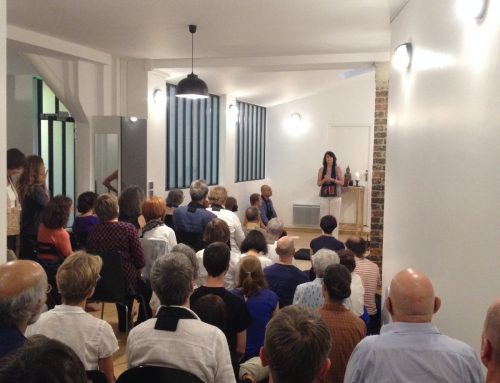During a pause while the dentist was doing work in my mouth today, he was telling me something (I can’t now recall what). I asked him why he was telling me this. He replied, to my surprise, « Je meuble le silence. » (I’m filling the silence.)
So much in the news, in the movies, on television, on the screens of our computers and « smart » phones, in our heads, is filling silence.
Maybe that’s why I’ve slowed down the entries here, allowing more space/time between them? Or maybe not. Maybe I can write more often, with shorter intervals of space/time, and still not fill the silence. Maybe the words can indeed be present and silent.
Let me know what you think.













http://www.swissfakeuhren.de
http://www.swissfakeuhren.de
I am breaking the silence; am I therefore “filling the silence”?
Not necessarily. But, to start with, is there a silence to be broken, to be “filled”? In fact, there’s never silence, otherwise we wouldn’t be able to “listening to the silence”, and (to use another religious metaphor) “stare at the silence around us” and/or learn from it. The musician John Cage made this very clear in 1952, when he composed his best-known and most controversial piece: 4’33’’.
“The score instructs the performer not to play the instrument during the entire duration of the piece—four minutes, thirty-three seconds—and is meant to be perceived as consisting of the sounds of the environment that the listeners hear while it is performed. (…) [The premiere] had disastrous consequences for Cage’s reputation. The press, which used to react favorably to earlier percussion and prepared piano music, ignored his new works, and many valuable friendships and connections were lost. Pierre Boulez, who used to promote Cage’s work in Europe, was opposed to Cage’s use of chance, and so were other composers who came to prominence during the 1950s, e.g. Karlheinz Stockhausen and Iannis Xenakis.”
— but this bit is already gossip, not small-talk.
I am telling you what I think; therefore I am “filling the silence”.
(rephrased perhaps, but still using 3 times the “I” word).
“Meubler le silence” is a funny expression since it seems to be an expression that doesn’t exist in other languages. (It can be translated as “filling the silence” but I’m not sure that’s an idiomatic expression in English – but maybe I’m wrong, my English is deficient). The closest thing I can think of is “killing time” or, if you want, to engage in “small talk to kill time”.
Small talk, talking about the weather (Portuguese [and French]: “falar do tempo”, “parler du temps”) is conversation for its own sake. There’s nothing wrong about that. It is a phenomenon that has been studied by Linguistics since the beginnings of last century (1920s). It is also known as "phatic communication" and it is considered a basic social skill (there’s the well-known example of someone talking on the phone: “yes… huh, huh… yes”). But scientists are divided (or at least I’ve divided them, for the sake of my argument!) about this: some consider that to perceive the silence of another person (or even a place) as hostility and even danger, is a feature limited to Western culture; others believe it runs deeper and it’s connected to our evolutionary history: in primates as in many other social animals silence is a communicative sign of danger.
Small-talk is a bounding ritual, an expression of friendship or, at least, of friendly feelings –although the same objective could be achieved with a… smile.
If I tell you what I think, I am “filling the silence” anyway.
— I and I and I again… Language is a funny thing; to write this sentence in English I had to use the “I” [pronoun] 3 times; to write it in Portuguese I only need one “I” (or even less: “Se lhe disser o que penso, estarei de qualquer maneira a “preencher o silêncio”) ; to write it in Latin, none.
“Meubler le silence” is a funny expression indeed, but not only because it uses the metaphor of furniture. In French it is also possible to say “meubler ses loisirs; meubler la mémoire de détails inutiles” (to cram one’s memory with trivia)… On the other hand, « meubler le silence /filling the silence” seems to be an expression that doesn’t exist in other languages. The closest I can think of is “killing time” (Portuguese: “matar o tempo”) or, if you want, to engage in “small talk to kill time”. But maybe I’m wrong, my English is deficient. Anyway, this reminds me of another expression: Schadenfreude (“pleasure derived from the misfortunes of others”). Wikipedia quotes schadenfreude as an exact of the Buddhist concept of —mudita—, "sympathetic joy" or "happiness in another’s good fortune". It also says it is used as a loanword from German, and that the same happens in some other languages. For example, there is no word for that is Portuguese either. To have to go around, and use 7 words to say what a German-speaking person can say with only one word “says” a lot about our cultures and about ourselves. Is it ultimately indifferent that one culture, people, person has one word for something and another culture-society-person doesn’t?
What my mouth cannot tell, my mind cannot speak.
I didn’t know the expression "je meuble le silence" and find it quite amusing. It looks like we’re adding furniture to embellish a room, the silence. And in the end ‘silence’ is just sounds we cannot hear – the room is already ‘full’, fully embellished as it is.
On reading your words I recalled Ronan Keating’s lyrics who sings "you say it best when you say nothing at all". I don’t mean ‘never write a word again’ !! Do write whenever you feel like, whenever you want to. Even when you don’t write anything there is plenty to ‘read’ in-between posts 🙂
silence can be ‘something’ – in contrast with something else.
but
it can be ‘a quality’ of of everything/presence
of a loud crowd
yet exactly there – is no ‘quality’ of something – for no something – no reflex
just
everything as it is awareness
Morandi shows us so beautiful both levels
as everything does
I am always happy about new entries…whatever space in between two, there is enough silence 🙂
what a funny expression : je meuble le silence. never heard that before. probably because hardly anybody assumes that the talking he/she does is just for not having silence. in regards to that it’s something special again, even if the talking before was not worth memorising.